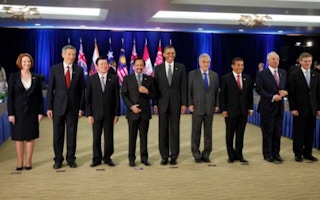APEC leaders meeting in Hawaii have committed to cutting tariffs on environmental goods to no more than 5 per cent by the end of 2015.
The US is pushing to reduce tariffs on so-called green goods such as solar panels.
Without a Hawaiian shirt in sight, the leaders issued a joint statement in which they said they would also eliminate non-tariff barriers that impede trade in green products.
“Taking these concrete actions will help our businesses and citizens access important environmental technologies at lower costs, which in turn will facilitate their use, contributing significantly to APEC’s sustainable development goals,” the statement said.
APEC economies will make a list of environmental goods next year and reduce tariffs, the statement said.
The statement also set an aspirational goal of reducing the bloc’s energy intensity - the amount of energy used compared with the economy - by 45 per cent by 2035.
Prime Minister Julia Gillard says the decision is a significant step forward globally.
“APEC has broken into a new frontier and that is the frontier of green growth,” she said.
“If we can reduce our energy intensity, then we are doing the right thing for our environment and our world. It means less carbon pollution. It also means more efficient production and more efficient products for people.”
Ms Gillard also praised the tariff reduction, saying it would be good for Australian producers who make things like water-saving shower heads and wind turbine gear boxes.
“We will experience the benefit of being able to get environmental products which we produce into the economies of APEC with less of a tariff load,” she said.
‘Too ambitious’
The United States made the trade in green goods, such as solar and wind energy, a priority for its chairmanship of the APEC forum, seeking a way to boost both job growth and environmental action.
But a senior Chinese official last week said that the goals set out by the US side were “too ambitious and beyond the reach of developing economies”.
In an apparent nod to Chinese concerns, the statement said that APEC would cut tariffs while “taking into account economies’ economic circumstances”.
After APEC ends, US president Barack Obama will stay in Hawaii before arriving in Australia on Wednesday.
He says he is pleased progress has been made in three key areas.
“We agreed to a new set of principals on innovation. They encourage the entrepreneurship that creates new businesses with simplified customs and exemptions from certain tariffs, will encourage more businesses to engage in more trade,” he said.
“We agreed to a new initiative that will make it easier and faster for people to travel and conduct business across the region.”










